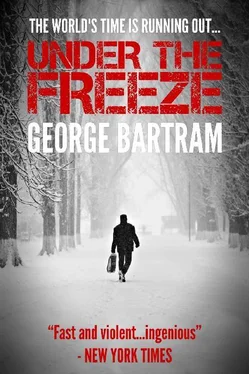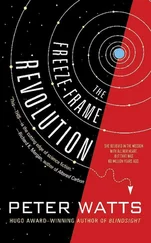“What’s the matter?” he said again as he examined them.
“The ballet mistress snores. Nothing.”
“What’s the matter?”
Repin scowled. Then, after seconds of scowling, he put a hand into the side pocket of the blazer and took out a plastic bag. In it was a piece of paper that had been water-soaked and dried, and now it was thickened and crumpled. He put it on the table and Tarp could see faded writing:
Doctor Bonano
to
Schneider, BA chem
via
?
“Well?”
“You see? It is nothing. I showed it to you only because you pestered me.”
“What is it?”
Repin made a face as if he had smelled something bad. “My contact turned up dead.” He nodded at the paper. “In his pocket.”
“Murdered?”
“He was thirty-four; what do you think, he had a heart attack? In the water. Head crushed.” He put both hands into the blazer’s pockets, the thumbs jutting forward. He was wearing a scarf in the open collar of a white shirt and he looked like a stage Englishman. “They say he was playing with somebody’s wife. Maybe. But, you know, in this business…” He made a face again. “Still, it was very crudely done. Not Department Five. Amateur work. Not professional mokrie dela .”
Tarp looked at the paper. “‘BA.’ Buenos Aires.”
“I’m not a geographer.” Repin sounded like an elitist discussing a lower class.
“Argentina is on the submarine’s route. Or at least it came close.” He waited for Repin to speak, but the old man was stubbornly looking away from him. “Since the Falklands mess, Argentina might be interested in atomic weapons.”
“The plutonium thefts started before the Falklands war.” He sounded angry — old-man angry, petulant.
“You can’t ignore this, you know.”
Repin swiveled his head slowly to look at him. “What are the possibilities? One, the paper means nothing and my contact was killed by his lover’s husband — nothing means nothing. Two, the paper means something, but he was murdered by the husband — a coincidence too good to be believed; something means nothing. Three, the death is mokrie dela , but the assassin overlooked the piece of paper, which is unbelievable — something means nothing again. Four, the death is mokrie dela and the paper is a trap. Out of those four possibilities, only one suggests the paper is any use to us.” He shook his head. “One in four is bad mathematics.”
“Five,” Tarp said, “the paper is genuine and he was murdered because he was your agent but not because of the paper and so they didn’t look for it. What do you think?”
“I think nothing.” He looked directly at Tarp; his eyes were fierce, seemingly a darker blue than usual. “You know this work as well as I do. There are times when it is not good to think because it is too soon.”
“But now we have to think.” Tarp touched the paper, and it spun on the corner of a fold. “They could have killed him and missed the paper. Oversights happen.”
“But you cannot count on them.”
“But killing a man so you can plant a message on him is extreme. Department Five is cautious, in my experience. Crazy, but cautious. It’s like the CIA and Castro; they had that insane idea to make his beard fall out, and they took months just talking about it. Crazy and cautious. No, if DGI or KGB killed your man, it was because he was a spy. But neither DGI nor KGB is in on the Maxudov business; the only ones who are are Maxudov’s own people. So if they did it, they probably did it quickly — reflexively. Defensively . And then, did they have time to think out what it meant, set up a trap, and plant the paper on him? How much time did they have, anyway? When did he die?”
“Last night. About two in the morning.”
“When did you see him alive?”
“Me, before you came to Havana; one of my people, yesterday.”
“So they had — a few hours. In a few hours, they made up a plan and carried it through? Maybe. Yes, it could be done. If there weren’t too many people involved. If they didn’t have to check back with Moscow.”
Repin’s smile was thin and sour. He hated bureaucracy, even though he had ended up as a bureaucrat. “It isn’t like shooting the pope, you know,” he said heavily.
“Well, you’ll admit at least that the message could be genuine.”
“How did it get into the pocket?”
“He was carrying it when he was killed, what else? Whoever killed him did it on impulse — got frightened, ran away. Or killed him in such a way that the body couldn’t be searched. Maybe he fell into the water from a height.”
“You should write for the films.”
“I’m thinking of possibilities.”
“You are persuading yourself of a fantasy.”
“Is the paper in his handwriting?”
“We think not.”
“How did he communicate with you?”
“Code through a drop.”
“This is not code.”
“Obviously.”
“Somebody passed him a paper with the writing already on it; he was killed before he had a chance to encode it.”
Repin bounced twice on the balls of his feet. He was wearing white-and-tan shoes with lavishly fringed tongues that danced in the sunlight. “This was a good man. He would not have kept such a paper very long. Minutes. Seconds. He would read it, then destroy it.”
“It was dark.”
Repin nodded. “It was dark; he took the paper, put it in his pocket — he will carry it only until he reaches a light — but he is killed even before that, so very quick, within seconds—” He looked at Tarp.
“Maybe the one who gave him the paper killed him.”
“Meaning that it is probably a trap. Now we are both writing films.” He sounded more cheerful, however. “I knew he had a source. He had been asking about plutonium and submarines. It was down around the docks. He sent a message two days ago he thought he would have something last night. You know what that says to me? I am such an idiot!” Repin struck himself on the side of the head and his straw hat fell off. He looked at it and then kicked it.
“Well?”
“He was waiting for somebody on a ship — what do you think? I am an idiot! And he was waiting because it was probably a ship that docked yesterday. Yah! My brain is turning to dust with age.”
“What would you do, question every crewmember of every ship that docked? It could be a fisherman — there are thousands in Cuba. Or it could have been somebody on a plane, Repin.”
“He was killed at the docks.”
“So?”
“Well.” Repin stuck out his lips in that characteristic expression of disgust. “Well, there he is, then, down near the docks in the dark. He meets the contact. The contact hands over the paper, my man hands over the money to pay for it. He turns away — ka !” Repin raised a hand, the fingers open as if he had just let the man’s life fall; his eyes followed it as it tumbled into the imagined water. “There is the body, the smashed head, the paper.” He folded his arms. “Maybe.”
“So the message could be genuine.”
“Could be. Not the likeliest possibility. Still…”
“Well?”
“I am very bothered by the matter of organization. In Moscow, we know we have Maxudov. A man of intelligence, power, passion. In Cuba, maybe we have half a dozen people Maxudov has corrupted. But do they kill for him? It is very, very difficult to get a man to kill for you. Unless he is entirely yours. And it is my feeling that Maxudov does not get very close to these people. He corrupts them a little, buys them off. But there is no belief here, no ideology, no passion. Let us say, for example, that I have decided to steal art works from the Hermitage. Fine. I bribe two guards; I bribe a trucker; I bribe some border guards. And so on. Right out of the Soviet Union to, let us say, a dealer in Bonn. Now, you find out about it. One of the people I have bribed realizes that you know. What is he going to do? Kill you to protect me? Of course not. He is going to cover his own backside with both hands and hope I fall down dead.”
Читать дальше












